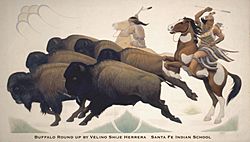Velino Herrera facts for kids
Quick facts for kids
Velino Shije Herrera
|
|
|---|---|
| Ma Pe Wi | |

"Buffalo Round," mural by Velino Shije Herrera
|
|
| Born | October 22, 1902 Zia Pueblo, NM
|
| Died | January 18, 1973 or January 30, 1973 (aged 70) |
| Nationality | Zia Pueblo, Native American |
| Education | Santa Fe Indian School |
| Known for | Painting |
| Style | Flatstyle |
| Patron(s) | Edgar Lee Hewett |
Velino Shije Herrera (October 22, 1902 – January 1973), also known as Ma Pe Wi, was a talented Zia Pueblo Native American painter. He was known for his unique "Flatstyle" of painting. This style often showed scenes from Pueblo life and important ceremonies.
Contents
Early Life and Art Training
Velino Shije Herrera was born in Zia Pueblo, New Mexico. He went to the Santa Fe Indian School. At that time, the Bureau of Indian Affairs did not allow art classes in schools.
However, the wife of the school's leader, Elizabeth Willis DeHuff, saw his talent. She invited Velino and his friends, who were also artists, to paint in her home. These friends included Fred Kabotie, Otis Polelonema, and Awa Tsireh. These painting sessions were very important. They helped start a new art movement called the Southwest Movement of Native American painting.
First Exhibitions and Recognition
In 1919, the paintings by Velino and his friends were shown at the Museum of New Mexico. The museum director, Edgar Lee Hewett, was very impressed. He hired Velino and other artists for different jobs at the museum. He also hired them for the School of American Research.
Velino once said, "Dr. Hewett chose a few of us he thought had talent. He helped us start painting. I was one of them. I have been painting ever since."
After the museum show, newspapers wrote about their amazing art. The next year, their work was shown in New York. It was part of the yearly exhibition of the Society of Independent Artists.
Major Works and Style
Velino Herrera's art was shown in many places. His paintings traveled across the United States and Europe. They were even part of a big traveling show called the Exposition of Tribal Indian Arts from 1931 to 1933.
He and five other artists received a special job. They were asked to paint huge murals for the Main Interior Building in Washington, DC. This building is home to the US Department of the Interior. Velino's part of the murals showed detailed scenes of Pueblo life. These included ceremonial kachina dances. He also created abstract art using Pueblo symbols.
Sometimes, showing traditional ceremonies in art was a sensitive topic within Native American communities.
Illustrating Books
Velino Herrera also created drawings for educational books. He worked on many books for the author Ruth Underhill. He also illustrated a book called In My Mother's House for Bureau of Indian Affairs author Ann Nolan Clark. This book was recognized as a Caldecott Honor book in 1942. This is a special award for children's picture books.
Later Life and Awards
In 1954, Velino Herrera received a special award from France. It was called the Ordre des Palmes Académiques. This award honors people who have made important contributions to education and culture.
Sadly, Velino was seriously hurt in a car accident. After this, he mostly stopped painting. He passed away in January 1973.
 | Ernest Everett Just |
 | Mary Jackson |
 | Emmett Chappelle |
 | Marie Maynard Daly |

